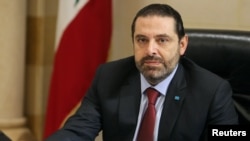Lebanon will declare an economic emergency and the government has begun work on a plan to accelerate public finance reforms, its prime minister said Monday.
Saad al-Hariri also said the policy of keeping stable the Lebanese pound, which is pegged to the dollar, would continue.
Cabinet ministers, politicians and lawmakers who met Monday reached consensus on an outline for a plan that would put public finances and the economy on a more sustainable path, Hariri said.
"There is agreement to announce a state of economic emergency," Hariri said.
"This difficult economic situation requires us taking speedy measures such as finishing the budget on time and reducing the deficit," Hariri told reporters after the meeting that President Michel Aoun also attended to address a worsening economic situation.
The government would hold more meetings to speed up the work, he said.
Lebanon is grappling with one of the world's heaviest public debt burdens at 150% of GDP and years of low economic growth.
Government finances, plagued by corruption and waste, are strained by a bloated public sector, debt-servicing costs and subsidizing the state power producer.
Hariri said accelerating reforms would avoid a crisis similar to Greece, which fell into a debt crisis nine years ago and had to adopt tough austerity measures under tight supervision by foreign creditors.
"We don't want this to happen to us. So we are taking measures to save the country," the prime minister said.
Credit rating
Hariri said Lebanon's credit rating downgrade by Fitch to CCC 10 days ago was a warning to take the needed measures to shore investor confidence before it was late.
Fitch said its downgrade from B- reflected "intensifying pressure on Lebanon's financing model and increasing risks to the government's debt servicing capacity."
Lebanese leaders have warned of a financial crisis without changes. The impetus to enact reforms has grown with the slowdown of deposits into Lebanon's banking sector, a critical source of finance for the state.






